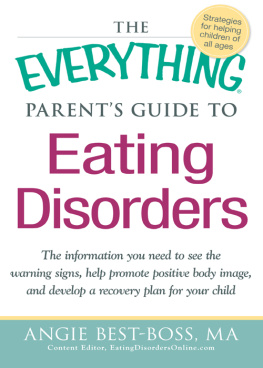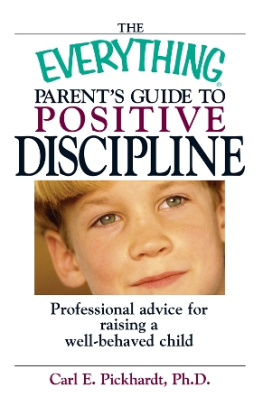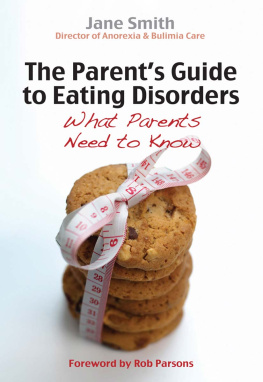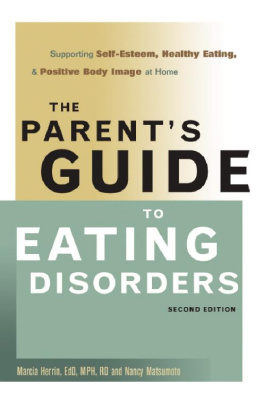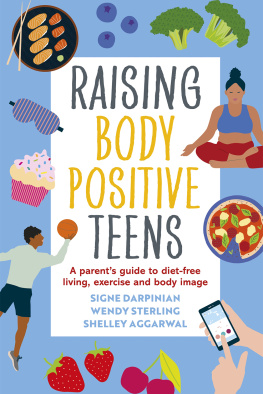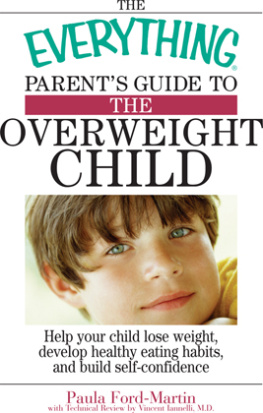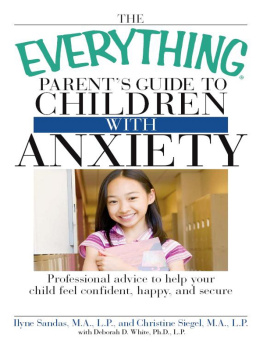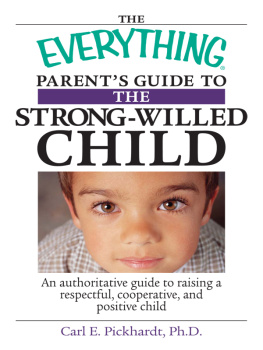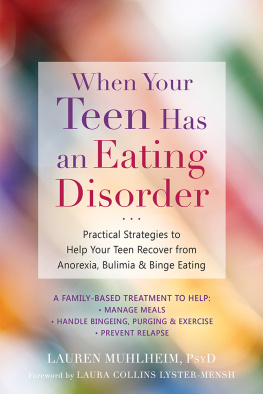THE

PARENTS GUIDE TO
EATING DISORDERS
Dear Reader,
Eating disorders have affected my life in more ways than I ever would have imagined. There was a time when the only thing I knew about eating disorders was what I had read. That was before. Before eating disorders affected people I love and almost took my life.
Recovery is possible. The journey through an eating disorder may well be the most difficult struggle one can encounter. The only path more difficult may be if ones own child is facing an eating disorder. It hurts to watch ones child literally unable to face eating. The emotional roller coaster is difficult to describe and ranges from fear and frustration to heartache and even anger.
My message to both you and your child you love is twofold. First, dont give up; never stop fighting. Second, the best you can do is enough, and there is no room for blame on this battlefield. Love, love, love.
Wishing you joy, comfort, and peace,

WELCOME TO THE

PARENTS GUIDE TO
Everything Parents Guides are a part of the bestselling Everything series and cover common parenting issues like childhood illnesses and tantrums, as well as medical conditions like asthma and juvenile diabetes. These family-friendly books are designed to be a one-stop guide for parents. If you want authoritative information on specific topics not fully covered in other books, Everything Parents Guides are your perfect solution.

Urgent warnings

Quick handy tips

Important snippets of information

Answers to common questions
When youre done reading, you can finally say you know EVERYTHING!
PUBLISHER Karen Cooper
DIRECTOR OF ACQUISITIONS AND INNOVATION Paula Munier
MANAGING EDITOR, EVERYTHING SERIES Lisa Laing
COPY CHIEF Casey Ebert
ASSISTANT PRODUCTION EDITOR Melanie Cordova
ACQUISITIONS EDITOR Brett Palana-Shanahan
SENIOR DEVELOPMENT EDITOR Brett Palana-Shanahan
EDITORIAL ASSISTANT Ross Weisman
EVERYTHING SERIES COVER DESIGNER Erin Alexander
LAYOUT DESIGNERS Erin Dawson, Michelle Roy Kelly,
Elisabeth Lariviere, Denise Wallace
Visit the entire Everything series at www.everything.com
THE

PARENTS GUIDE TO
EATING
DISORDERS
The information you need to see the warning signs, help promote positive body image, and develop a recovery plan for your child
Angie Best-Boss, MA
Content Editor, EatingDisordersOnline.com

Dedication
Dedicated to Terry and Kim Moore of Nonviolent
Alternatives (www.nonviolentalternatives.com), for saving my life and helping me heal.
Acknowledgments
I am grateful for the dozens of professionals, parents, and children who shared their insight, expertise, and personal stories. A few of the professionals I am indebted to include Ashley Solomon, PsyD (www.nourishing-the-soul.com);
Margarita Tartakovsky, MS (http://blogs.psychcentral.com/weightless); Rosie Molinary (www.rosiemolinary.com), author
of Beautiful You: A Daily Guide to Radical Self-Acceptance and Hijas Americanas: Beauty, Body Image, and Growing Up Latina; Diane Keddy, MS, RD, FAED (www.dianekeddy.com);
Katja Rowell, MD (www.familyfeedingdynamics.com); and
Laura Stern (www.laurenlazarstern.com), author of The Slender Trap: A Food and Body Workbook.
eating disorder
(etng ds-rdr)
n. Serious, potentially life-threatening, biologically based mental illness, usually characterized by daily functioning affected by disordered body image, a preoccupation with and anxiety related to food and eating, and disordered eating.
Introduction
E ating disorders are a prevalent and dangerous disease that affects millions of children, adolescents, and adults and can begin as young as six years old. Eating disorders can affect anyone, regardless of gender, race, age, or economic level or religious belief system. They have been found in every country in the world. It is a growing problem across all age groups.
Eating disorders are not easy to define, either. From starving oneself through anorexia nervosa, binge eating, binging and purging in bulimia, to night eating or having diabetes and refusing insulin in order to lose weight, the sheer range of potential disordered eating behaviors can feel overwhelming. What is a parent supposed to do?
First, parents must understand that while an eating disorder requires mental health treatment, it is a medical problem that often requires medical treatment. The longer an eating disorder continues, the greater the likelihood that significant medical problems will develop and may even be fatal. To make an accurate diagnosis and treatment even more challenging, many eating disorder sufferers have coexisting conditions, including depression, anxiety, self-mutilation, or substance abuse.
There is no such thing as a harmless eating disorder. A child does not have to be emaciated or even underweight for health problems to occur. After all, an overweight child who has a binge eating disorder has significant emotional and physical issues that need attention.
Eating disorders are biologically based mental illness and fully treatable with a combination of nutritional, medical, and therapeutic supports. However, getting a diagnosis and finding appropriate, evidence-based treatment is often a challenge.
Parents do not cause eating disorders, and if a health care provider or mental health specialist indicates otherwise, run to the nearest exit and seek treatment providers who are better informed regarding eating disorder research and treatment. Parents do, however, play a powerful role in their childrens recovery. And recovery is possible, even with a child or adolescent who insists there is not a problem and does not want to get help.
Some parents discover their childs eating disorder fairly early and are able to begin treatment quickly without needing medical intervention, while others may not be aware of their childs disorder until it has become an entrenched problem with medical problems that must be addressed before the eating disorder can be treated. Parental involvement is crucial at every stage of the eating disorder treatment process, regardless of how far the disease has progressed.

